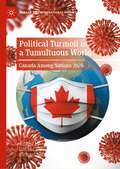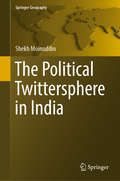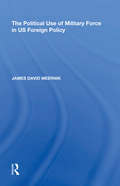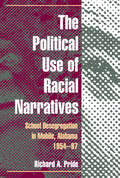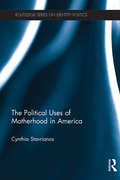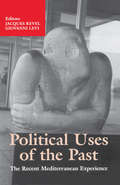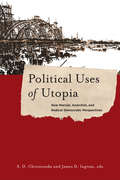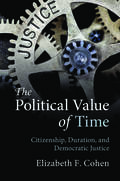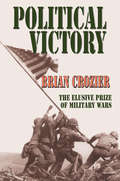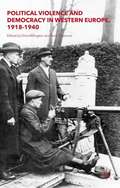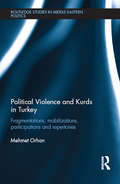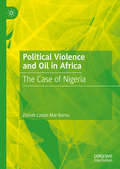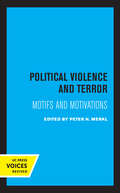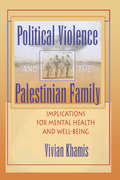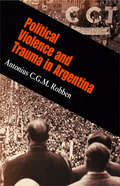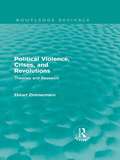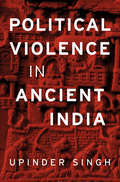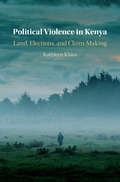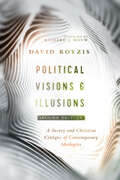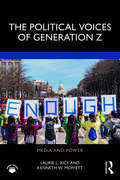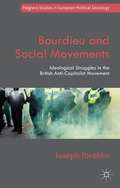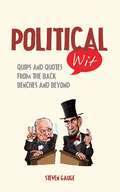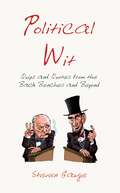- Table View
- List View
Political Turmoil in a Tumultuous World: Canada Among Nations 2020 (Canada and International Affairs)
by David Carment Richard NimijeanIn the last two years, Canadian society has been marked by political and ideological turmoil. How does an increasingly divided country engage a world that is itself divided and tumultuous? Political instability has been reinforced by international uncertainty: the COVID-19 pandemic, populism, Black Lives Matter, and the chaotic final year of the Trump presidency that increased tensions between the West, China and Russia. Even with a Biden presidency, these issues will continue to influence Canada’s domestic situation and its ability to engage as an effective global actor. Contributors explore issues that cause or reflect these tensions, such as Canada’s willingness to address pressing crises through multilateralism, including the COVID-19 pandemic. Can Canada forge its own path in a turbulent world?
The Political Twittersphere in India (Springer Geography)
by Shekh MoinuddinThe book investigates political re/tweets that reveal the nature and patterns of politics and digital political revolution in India. The re/tweets are made by Indian politicians at various capacities in order to communicate to followers, which shaped the political discourse in form of response, activism, and technology. The book is based on interdisciplinary approaches wherein geography interfaces with political, cultural, social, economic and social media studies.The book is mapping patterns of spatial politics through Twitter which revolutionized the digital politics in India. It discusses and answers the questions: Why do politicians use Twitter and other social networking sites? When do politicians make re/tweets? Is Twitter all about official?The book triggers questions about the politics of gadgets. To what extent are politics inseparable from re/tweets? The book adheres the inevitable role of technology, particularly of Twitter in day-to-day spatial reporting in the shape of politics, culture, identity, ideology, norms and empiricism.This book is the result of the research project “Mapping Political Tweets: The Digital Political Revolution in India” (2015–16), funded by Kalindi College, University of Delhi, New Delhi. KC/GB/3349(a).The book appeals to research scientists, graduate students and practitioners in the fields of political science, media representation, communication, and those who have interests to investigate the linkages between different parts of geography and social science with communication technology.
The Political Use of Military Force in US Foreign Policy
by James David MeernikFrom the Quasi War with France and the opening of Japan, to the numerous interventions of the 1990s, these events have been situated at the heart of US foreign policy. There are four different explanations as to why the US, throughout its history, has used military force just short of war. Some scholars have suggested that nations use military force on behalf of security objectives. Others have maintained that economic self-interest has motivated many military interventions. Recently many researchers have explored the extent to which the US has used force to promote democracy and human rights, and still more scholars have argued that presidents use limited force for domestic political purposes. Assessing the utility of each of these explanations throughout US history, Meernik employs both historical narrative and statistical techniques to provide a comprehensive account of these important foreign policy events. This engaging, highly informative volume is particularly suited to scholars and students in the fields of international relations, foreign policy, military affairs and history.
The Political Use of Racial Narratives: School Desegregation in Mobile, Alabama, 1954-97
by Richard A. PrideArguing that politics is essentially a contest for meaning and that telling a story is an elemental political act, Richard A. Pride lays bare the history of school desegregation in Mobile, Alabama, to demonstrate the power of narrative in cultural and political change. This book describes the public, personal, and meta-narratives of racial inequality that have competed for dominance in Mobile. Pride begins with a white liberal's quest to desegregate the city's public schools in 1955 and traces which narratives--those of biological inferiority, white oppression, the behavior and values of blacks, and others--came to influence public policy and opinion over four decades. Drawing on contemporaneous sources, he reconstructs the stories of demonstrations, civic forums, court cases, and school board meetings as citizens of Mobile would have experienced them, inviting readers to trace the story of desegregation in Mobile through the voices of politicians, protestors, and journalists and to determine which narratives were indeed most powerful. Exploring who benefits and who pays when different narratives are accepted as true, Pride offers a step-by-step account of how Mobile's culture changed each time a new and more forceful narrative was used to justify inequality. More than a retelling of Mobile's story of desegregation, The Political Use of Racial Narratives promotes the value of rhetorical and narrative analysis in the social sciences and history.
The Political Uses of Expert Knowledge: Immigration Policy and Social Research
by Christina BoswellWhy do politicians and civil servants commission research, and what use do they make of it in policymaking? The received wisdom is that research contributes to improving government policy. Christina Boswell challenges this view, arguing that policymakers are just as likely to value expert knowledge for two alternative reasons: as a way of lending authority to their preferences; or to signal their capacity to make sound decisions. Boswell develops a compelling new theory of the role of knowledge in policy, showing how policymakers use research to establish authority in contentious and risky areas of policy. She illustrates her argument with an analysis of European immigration policies, charting the ways in which expertise becomes a resource for lending credibility to controversial claims, underpinning high-risk decisions or bolstering the credibility of government agencies. This book will make fascinating reading for those interested in the interface between policymaking, academic research and political legitimacy.
The Political Uses of Motherhood in America (Routledge Series on Identity Politics)
by Cynthia StavrianosAs various contemporary groups use the language of motherhood to advance their political causes, maternal rhetoric has become very visible in the American political discourse of late. Yet while it has long been recognized that women have invoked their political status as mothers to organize and authorize their political action in the past, scholars have only just begun to examine the recent reemergence of this frame. This book describes the wide variety of political causes that mothers are organizing to address, and analyses whether ideologically conservative organizations are disproportionately represented among groups using motherhood to mobilize women. Stavrianos examines the use of maternal discourses in closer detail through a comparative case study of five groups using motherhood as their primary frame for collective political action: Mothers Against Drunk Driving, Million Mom March, Mothers Against Illegal Aliens, Mainstreet Moms Organize or Bust, and Mothers in Charge. Scholars interested in women and politics, interest group politics, social movements, political behavior, women’s studies, motherhood studies, and framing strategies will find this book noteworthy, as it adds to a growing body of literature exploring the use of motherhood as an emerging political frame, and to the interdisciplinary discussion of contemporary discourses of motherhood.
Political Uses of the Past: The Recent Mediterranean Experiences (A\special Issue Of Mediterranean Historical Review Ser.)
by Jacques Revel Giovanni LeviThis work addresses political and historiographical uses of history. A group of leading historians and thinkers discuss questions of collective identity and representation in relation to the fluctuating concept of "Past" and its changing relevance. Among the topics are Greek historiographical questions, Balkan history, the Armenian problem, and the Plaestine historical narrative.
Political Uses of Utopia: New Marxist, Anarchist, and Radical Democratic Perspectives (New Directions in Critical Theory #26)
by Edited by S. D. Chrostowska James D. IngramUtopia has long been banished from political theory, framed as an impossible—and possibly dangerous—political ideal, a flawed social blueprint, or a thought experiment without any practical import. Even the "realistic utopias" of liberal theory strike many as wishful thinking. Can politics think utopia otherwise? Can utopian thinking contribute to the renewal of politics?In Political Uses of Utopia, an international cast of leading and emerging theorists agree that the uses of utopia for politics are multiple and nuanced and lie somewhere between—or, better yet, beyond—the mainstream caution against it and the conviction that another, better world ought to be possible. Representing a range of perspectives on the grand tradition of Western utopianism, which extends back half a millennium and perhaps as far as Plato, these essays are united in their interest in the relevance of utopianism to specific historical and contemporary political contexts. Featuring contributions from Miguel Abensour, Étienne Balibar, Raymond Geuss, and Jacques Rancière, among others, Political Uses of Utopia reopens the question of whether and how utopianism can inform political thinking and action today.
The Political Value of Time: Citizenship, Duration, and Democratic Justice
by Elizabeth F. CohenWaiting periods and deadlines are so ubiquitous that we often take them for granted. Yet they form a critical part of any democratic architecture. When a precise moment or amount of time is given political importance, we ought to understand why this is so. The Political Value of Time explores the idea of time within democratic theory and practice. Elizabeth F. Cohen demonstrates how political procedures use quantities of time to confer and deny citizenship rights. Using specific dates and deadlines, states carve boundaries around a citizenry. As time is assigned a form of political value it comes to be used to transact over rights. Cohen concludes with a normative analysis of the ways in which the devaluation of some people's political time constitutes a widely overlooked form of injustice. This book shows readers how and why they need to think about time if they want to understand politics.
Political Victory: The Elusive Prize of Military Wars
by Brian CrozierSuccess in war has always been difficult to measure. What is judged successful by military leaders may not be judged so by political leadership, nor by the wider public, at least in a Western-style democracy. The public is generally inclined to applaud military victory, but it instinctively reserves the right to ask afterwards: Was it really worth it? In Political Victory, Brian Crozier looks at modern wars involving democracies to evaluate victory and defeat by the success or failure of political outcomes.Crozier begins with the two world wars, where in both cases the German aggressor was defeated by three key democracies: the United States, the United Kingdom, and France. In World War I military victory was squandered by treaty terms that led to the advent of Hitler and Nazism. By contrast, the total defeat of Nazism in 1945 left the Western Allies in charge of some two-thirds of Germany's population, thus enabling the victors to convert the vanquished to democracy. Crozier also deals with the break up of empires following World War II, comparing how Britain avoided full-scale war in contrast with France's violent confrontations in Southeast Asia and Algeria.America's involvement in Vietnam is analyzed in the wider context of the Cold War and the mounting challenge of international communism to Western democracies. His assessment stresses the lack of popularity in America for the idea of democratizing a region to which the U.S. has no historical or sentimental attachment. Among the smaller conflicts considered in this volume are the Suez crisis of 1956, the Falkland Island war between Britain and Argentina, and the fateful Soviet involvement in Afghanistan that helped bring about the collapse of the Soviet system. Crozier concludes with analyses of the 1991 Gulf War and the Western intervention in the former Yugoslavia.Crozier's final chapters focus on looming threats around the world with particular emphasis on international terrorism and the challenge of radical Islam. Both historical and timely, Political Victory will be of interest to military historians, political scientists, and foreign affairs specialists.
Political Violence and Democracy in Western Europe, 1918�1940
by Chris Millington Kevin PassmoreThe contributions in this collection explore manifestations of political violence in the democracies of interwar Europe. While research in this area usually focuses on the regimes that fell to fascism, Political Violence and Democracy in Western Europe, 1918-1940 demonstrates that violence remained a part of political competition in the democratic regimes of Western Europe too. Left-wing and right-wing ideas and uses of violence are examined in countries such as Britain, France, Belgium, the Netherlands, as well as in Italy and Germany. By assembling the latest research in the field it demonstrates that democracy does not necessarily provide an antidote to violent political conflict.
Political Violence and Kurds in Turkey: Fragmentations, Mobilizations, Participations & Repertoires (Routledge Studies in Middle Eastern Politics)
by Mehmet OrhanThe Kurdish conflict is an acknowledged long-standing issue in the Middle East, and the emergence of radical Kurdish nationalist movements in the 20th century played a decisive role in the evolution of political violence. Political Violence and Kurds in Turkey examines how this political violence impacts Kurds in contemporary Turkey, and explores the circumstances that move human beings to violent acts. It looks at the forms political violence takes and in which times and spaces it occurs, as well as the roles played by micro and macro factors. It takes a theoretical approach to violence, as both producer and product of interrelations between many actors, and contextualises this with studies of violence in Kurdish villages and towns. The book evaluates the three levels at which political violence operates; between the state and Kurdish movements, among Kurdish groups and between Kurdish political organizations and Kurdish society, and divides it into its different aspects and processes; fragmentation-segmentation (signifying intra-ethnic struggles between Kurdish actors), mobilization (the course leading the Kurdish movement to armed conflict), participation (the use of violence by individuals) and repertoires (the forms taken by political violence). Offering an in-depth analysis of the dynamics behind political violence and its use amongst Kurds in Turkey, this book will be a key resource for students and scholars of Middle Eastern, Kurdish Studies and Conflict Studies, and offers new understanding and approaches to the study of political violence.
Political Violence and Oil in Africa: The Case of Nigeria
by Zainab Ladan Mai-BornuThe book argues that in order to better understand the undercurrents of the Niger Delta conflict, it is imperative to analyse the dynamics of choice in terms of the distinct courses of action taken by the Ogoni and Ijaw. Given the similar structural constraints, the author considers why the Ogoni adopted nonviolent resistance, and the Ijaw violent resistance. This book is divided into seven chapters starting with an introduction to oil and political violence in African conflicts, and includes a synoptic overview of four other resource-rich countries in Africa. Theoretical and conceptual underpinnings of conflict are then presented with the aim of situating the Niger Delta conflicts within the wider conflict literature. Chapter Three concentrates the discussion on the Nigerian Niger Delta, outlining the core issues at the centre of the contestations. The following three chapters offer an in-depth empirical analysis on the interaction between the narratives on nonviolence versus violence, the nature of leadership styles, and the organisation of the Ogoni and Ijaw movements along with a concluding chapter.
Political Violence and Terror: Motifs and Motivations
by Peter H. MerklThis title is part of UC Press's Voices Revived program, which commemorates University of California Press’s mission to seek out and cultivate the brightest minds and give them voice, reach, and impact. Drawing on a backlist dating to 1893, Voices Revived makes high-quality, peer-reviewed scholarship accessible once again using print-on-demand technology. This title was originally published in 1986.
Political Violence and the Palestinian Family: Implications for Mental Health and Well-Being
by Vivian KhamisWhat has political occupation done to Palestinian family life in the West Bank, Jerusalem, and the Gaza Strip?A psychological study of family members affected by unrest, Political Violence and the Palestinian Family: Implications for Mental Health and Well-Being examines families living in the midst of the conflict in the Middle East to help mental health professionals, social scientists, counselors, and students in these fields create appropriate intervention methods and provide relevant and effective services. Discussing coping, social support, ideology, and the sociopolitical conditions of Palestinian families, this comprehensive guide is the first book that specifically focuses on Palestinians. Political Violence and the Palestinian Family combines quantitative and qualitative research to clarify the sociological and psychological impacts upon Palestinian family life in the wake of the Intifada (the Palestinian uprising against Israeli occupation). This book depicts the human cost of Israeli occupation on this population and the failure of the Palestinian Authority to ameliorate the effects of violence on this society.Political Violence and the Palestinian Family discusses: political victimization and how it affects families the psychiatric symptomatology of Palestinians the psychological and somatic sequelae of political trauma techniques for successful sessions with Palestinian clients appraisal and coping techniques the values and beliefs of PalestiniansPolitical Violence and the Palestinian Family: Implications for Mental Health and Well-Being will help mental health professionals, social scientists, counselors, and students create appropriate intervention methods and provide relevant and effective services to Palestinian clients.
Political Violence and Trauma in Argentina (The Ethnography of Political Violence)
by Antonius C. RobbenFor decades, Argentina's population was subject to human rights violations ranging from the merely disruptive to the abominable. Violence pervaded Argentine social and cultural life in the repression of protest crowds, a ruthless counterinsurgency campaign, massive numbers of abductions, instances of torture, and innumerable assassinations. Despite continued repression, thousands of parents searched for their disappeared children, staging street protests that eventually marshaled international support. Challenging the notion that violence simply breeds more violence, Antonius C. G. M. Robben's provocative study argues that in Argentina violence led to trauma, and that trauma bred more violence.In this work of superior scholarship, Robben analyzes the historical dynamic through which Argentina became entangled in a web of violence spun out of repeated traumatization of political adversaries. This violence-trauma-violence cycle culminated in a cultural war that "disappeared" more than ten thousand people and caused millions to live in fear. Political Violence and Trauma in Argentina demonstrates through a groundbreaking multilevel analysis the process by which different historical strands of violence coalesced during the 1970s into an all-out military assault on Argentine society and culture.Combining history and anthropology, this compelling book rests on thorough archival research; participant observation of mass demonstrations, exhumations, and reburials; gripping interviews with military officers, guerrilla commanders, human rights leaders, and former disappeared captives. Robben's penetrating analysis of the trauma of Argentine society is of great importance for our understanding of other societies undergoing similar crimes against humanity.
Political Violence, Crises and Revolutions: Theories and Research (Routledge Revivals)
by Ekkart ZimmermannFirst published in 1983, this extraordinary study provides a comprehensive systematic evaluation of cross-national theorizing and quantitative empirical evidence on four interrelated phenomena: Political violence Crises Military Coups D’ État Revolutions. Findings from social-psychological research on aggression are integrated in this outstanding study, as well as results reported in social-historical studies of revolution. The focus of the book is always on analytical perspectives and corresponding empirical evidence. The author continually highlights the sociostructural and political conditions of political violence, crises and revolutions. This exceptionally detailed and systematic inventory of theories and research on a classic triad of political science (political violence, crises and revolutions) also includes a remarkable bibliography encompassing over 3000 items.
Political Violence in Ancient India
by Upinder SinghGandhi and Nehru helped create a myth of nonviolence in ancient India that obscures a troubled, complex heritage: a long struggle to reconcile the ethics of nonviolence with the need to use violence to rule. Upinder Singh documents the tension between violence and nonviolence in ancient Indian political thought and practice, 600 BCE to 600 CE.
Political Violence in Kenya: Land, Elections, and Claim-Making
by Kathleen KlausExamining a key puzzle in the study of electoral violence, this study asks how elites organize violence and why ordinary citizens participate. While existing theories of electoral violence emphasize weak institutions, ethnic cleavages, and the strategic use of violence, few specify how the political incentives of elites interact with the interests of ordinary citizens. Providing a new theory of electoral violence, Kathleen F. Klaus analyzes violence as a process of mobilization that requires coordination between elites and ordinary citizens. Drawing on fifteen months of fieldwork in Kenya, including hundreds of interviews and an original survey, Political Violence in Kenya argues that where land shapes livelihood and identity, and tenure institutions are weak, land, and narratives around land, serve as a key device around which elites and citizens coordinate the use of violence. By examining local-level variation during Kenya's 2007–8 post-election violence, Klaus demonstrates how land struggles structure the dynamics of contentious politics and violence.
Political Visions & Illusions: A Survey & Christian Critique of Contemporary Ideologies
by David T. KoyzisWhat you believe about politics matters. The decades since the Cold War, with new alignments of post–9/11 global politics and the chaos of the late 2010s, are swirling with alternative visions of political life, ranging from ethnic nationalism to individualistic liberalism. Political ideologies are not merely a matter of governmental efficacy, but are intrinsically and inescapably religious: each carries certain assumptions about the nature of reality, individuals and society, as well as a particular vision for the common good. These fundamental beliefs transcend the political sphere, and the astute Christian observer can discern the ways—sometimes subtle, sometimes not—in which ideologies are rooted in idolatrous worldviews. In this freshly updated, comprehensive study, political scientist David Koyzis surveys the key political ideologies of our era, including liberalism, conservatism, nationalism, democracy, and socialism. Koyzis gives each philosophy careful analysis and fair critique, unpacking the worldview issues inherent to each and pointing out essential strengths and weaknesses, as well as revealing the "narrative structure" of each—the stories they tell to make sense of public life and the direction of history. Koyzis concludes by proposing alternative models that flow out of Christianity's historic engagement with the public square, retrieving approaches for both individuals and the global, institutional church that hold promise for the complex political realities of the twenty-first century. Writing with broad international perspective and keen analytical insight, Koyzis is a sane and sensible guide for Christians working in the public square, culture watchers, political pundits, and all students of modern political thought.
The Political Voices of Generation Z (Media and Power)
by Laurie L Rice Kenneth W MoffettThis book explores political expression of members of Generation Z old enough to vote in 2018 and 2020 on issues and movements including MeToo, Supreme Court nominations, March for Our Lives, immigration and family separation, and Black Lives Matter. Since generational dividing lines blur, we study 18 to 25-year-olds, capturing the oldest members of Generation Z along with the youngest Millennials. They share similarities both in their place in the life cycle and experiences of potentially defining events. Through examining some movements led by young adults and others led by older generations, as well as issues with varying salience, core theories are tested in multiple contexts, showing that when young adults protest or post about movements they align with, they become mobilized to participate in other ways, too, including contacting elected officials, which heightens the likelihood of their voices being heard in the halls of power.Perfect for students and courses in a variety of departments at all levels, the book is also aimed at readers curious about contemporary events and emerging political actors.
The Political Web
by Peter DahlgrenAs democracy encounters difficulties, many citizens are turning to the domain of alternative politics and, in so doing, making considerable use of the new communication technologies. This volume analyses the various factors that shape such participation, and addresses such key topics as civic subjectivity, web intellectuals, and cosmopolitanism.
Political Wit: Quips and Quotes from the Back Benches and Beyond (Wit Ser.)
by Steven GaugeOrder, order! After a long day at the dispatch box, when your honourable friend’s white paper has made you feel green and your poll ratings have slumped to a new low, hunker down in Speakers’ Corner with this grand coalition of political quips and quotes – you’ll be ready to take on the opposition at any time!
Political Wit: Quips and Quotes from the Back Benches and Beyond (Wit Ser.)
by Steven GaugeOrder, order! After a long day at the dispatch box, when your honourable friend’s white paper has made you feel green and your poll ratings have slumped to a new low, hunker down in Speakers’ Corner with this grand coalition of political quips and quotes – you’ll be ready to take on Jeremy Paxman again in no time!
Political Wit: Quips and Quotes from the Back Benches and Beyond (Wit Ser.)
by Steven GaugeOrder, order! After a long day at the dispatch box, when your honourable friend’s white paper has made you feel green and your poll ratings have slumped to a new low, hunker down in Speakers’ Corner with this grand coalition of political quips and quotes – you’ll be ready to take on Jeremy Paxman again in no time!
